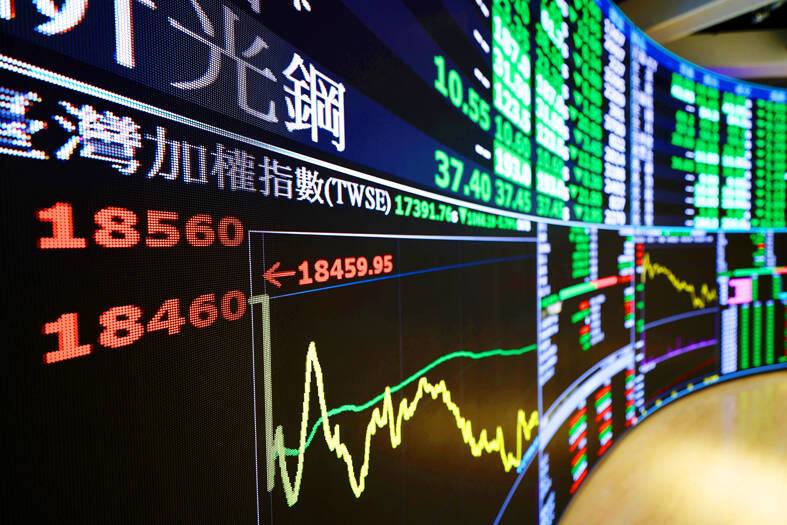The number of small retail investors increased 2.08 percent in the first quarter of this year from the previous quarter, suggesting they intend to hold or even buy the dip, despite facing a correction on the local stock market.
The latest data released on Monday by the Taiwan Stock Exchange (TWSE) showed that the number of retail investors with quarterly trading of less than NT$100 million (US$3.08 million) of stocks in the first quarter increased by 106,829 from the previous quarter to 5.23 million, the second-highest level on record.
The highest number of small retail investors, 5.52 million, was recorded in the third quarter of last year, TWSE data showed.

Photo: Ritchie B. Tongo, EPA-EFE
In contrast, the number of retail investors with minimum quarterly trading of NT$500 million in stocks in the first quarter fell 694, or 21 percent, to 2,622, while those with quarterly turnover of NT$100 million to NT$500 million dropped 5,710, or 20.5 percent, to 22,048, the exchange said in a statement.
Last quarter, the number of “big players” and “mid-sized players” fell to their lowest levels since the second quarter of 2023, when figures stood at 2,427 and 20,546 respectively, TWSE data showed.
The retreat came as stocks in Taiwan slumped in the first quarter amid worries about US President Donald Trump’s tariff policy and Chinese start-up DeepSeek’s (深度求索) launch of its less costly artificial intelligence model rattled investors and generated volatile market trading.
During the first quarter, the TAIEX plunged 2,340 points and the total market capitalization of TWSE stocks decreased NT$7.35 trillion, exchange data showed.
Overall, retail investors accounted for 50.8 percent of the market’s turnover of NT$19.9 trillion in the first quarter, down from 52.8 percent in the previous quarter, while foreign institutional investors made up 36.21 percent, also down from 35.04 percent.
Local institutional investors represented the remaining 12.99 percent, up from 12.16 percent the previous quarter, the TWSE said.
The TAIEX yesterday closed 1.96 percent lower at 19,468.
The index has fallen 15.49 percent since the beginning of the year, exchange data showed.

To many, Tatu City on the outskirts of Nairobi looks like a success. The first city entirely built by a private company to be operational in east Africa, with about 25,000 people living and working there, it accounts for about two-thirds of all foreign investment in Kenya. Its low-tax status has attracted more than 100 businesses including Heineken, coffee brand Dormans, and the biggest call-center and cold-chain transport firms in the region. However, to some local politicians, Tatu City has looked more like a target for extortion. A parade of governors have demanded land worth millions of dollars in exchange

An Indonesian animated movie is smashing regional box office records and could be set for wider success as it prepares to open beyond the Southeast Asian archipelago’s silver screens. Jumbo — a film based on the adventures of main character, Don, a large orphaned Indonesian boy facing bullying at school — last month became the highest-grossing Southeast Asian animated film, raking in more than US$8 million. Released at the end of March to coincide with the Eid holidays after the Islamic fasting month of Ramadan, the movie has hit 8 million ticket sales, the third-highest in Indonesian cinema history, Film

Taiwan Semiconductor Manufacturing Co’s (TSMC, 台積電) revenue jumped 48 percent last month, underscoring how electronics firms scrambled to acquire essential components before global tariffs took effect. The main chipmaker for Apple Inc and Nvidia Corp reported monthly sales of NT$349.6 billion (US$11.6 billion). That compares with the average analysts’ estimate for a 38 percent rise in second-quarter revenue. US President Donald Trump’s trade war is prompting economists to retool GDP forecasts worldwide, casting doubt over the outlook for everything from iPhone demand to computing and datacenter construction. However, TSMC — a barometer for global tech spending given its central role in the

Alchip Technologies Ltd (世芯), an application-specific integrated circuit (ASIC) designer specializing in server chips, expects revenue to decline this year due to sagging demand for 5-nanometer artificial intelligence (AI) chips from a North America-based major customer, a company executive said yesterday. That would be the first contraction in revenue for Alchip as it has been enjoying strong revenue growth over the past few years, benefiting from cloud-service providers’ moves to reduce dependence on Nvidia Corp’s expensive AI chips by building their own AI accelerator by outsourcing chip design. The 5-nanometer chip was supposed to be a new growth engine as the lifecycle